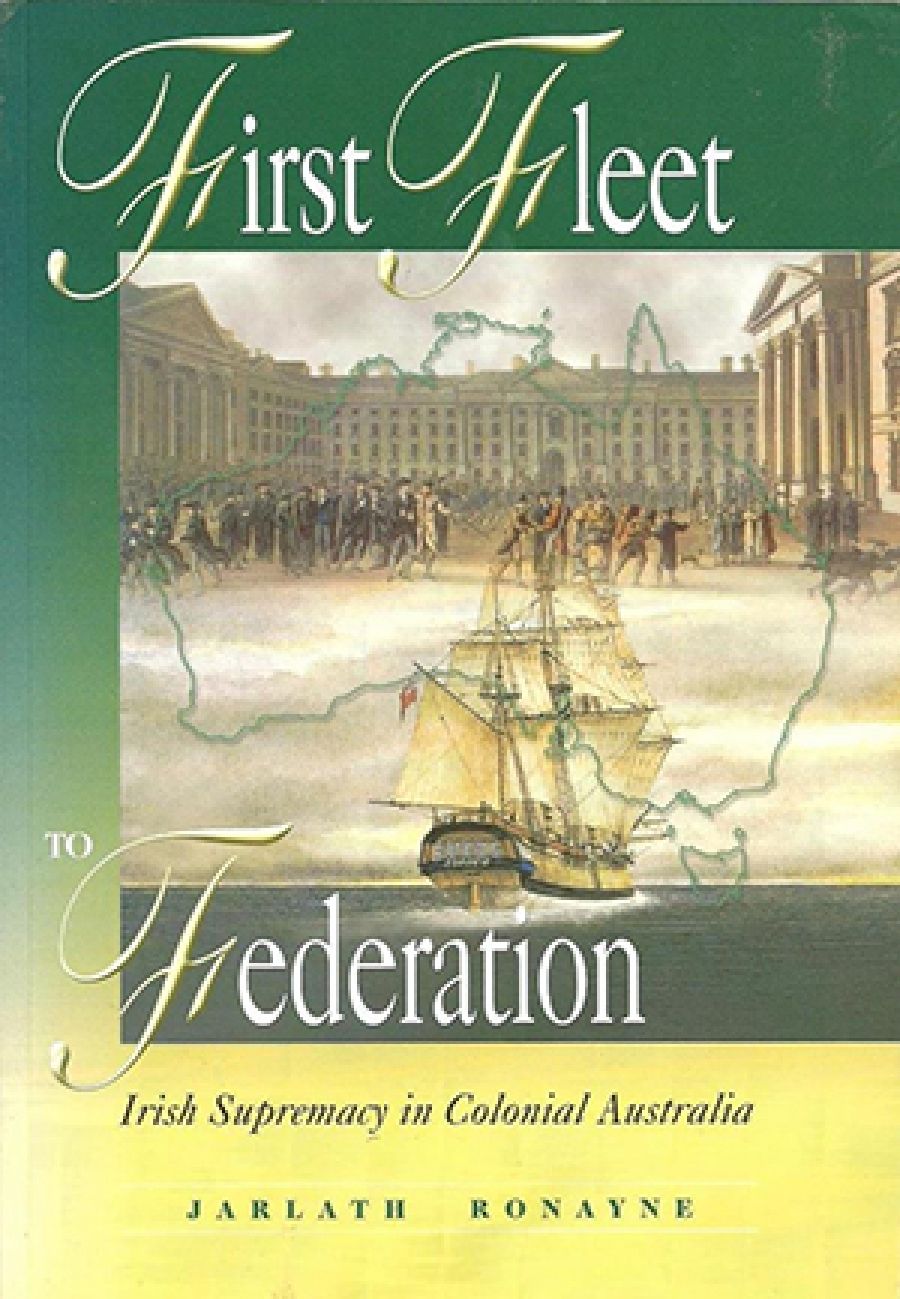
- Free Article: No
- Contents Category: Australian History
- Review Article: Yes
- Online Only: No
- Custom Highlight Text:
It was inevitable, sooner or later, someone would write a book celebrating the achievements of the Protestant Irish in Australia. Books commemorating the part played by the Catholic Irish culminated in Patrick O’Farrell’s ambit claim that they were responsible for just about everything we like to think of (or used to think of) as being distinctively Australian. Now Professor Jarlath Ronayne has given us his own hyperbolic response in the subtitle of this sumptuous publication. The best way to see the book is as a useful reminder that ‘Irish’ and ‘Catholic’ were not synonyms in colonial Australia. Irish-born Protestants, whether they were members of the Ascendancy élite or, as in most cases, of much more modest origins, identified themselves as Irish. In early Melbourne, they joined with the Catholic Irish to celebrate St Patrick’s Day as their national event. However, their Irish ‘nation’ was the Protestant nation euphorically invoked by the Protestant ‘Patriots’ of ‘Grattan’s Parliament’ in the 1780s. And Trinity College, Dublin, was the alma mater of that minority ‘nation’.
- Book 1 Title: First Fleet to Federation
- Book 1 Subtitle: Irish supremacy in colonial Australia
- Book 1 Biblio: Trinity College Dublin Press $34.95pb, 272pp
Ronayne draws on the overwhelmingly Protestant graduates of Trinity College to pick his team of Australian nation-builders. A handful of significant Catholics from Trinity, such as J.H. Plunkett and Roger Therry, came to the Australian colonies, but the College was not open to Catholics until 1793 and, from then until 1970, they were nominally barred by the Catholic bishops. How ironic it is that today Trinity College is, in its student population at least, an overwhelmingly Catholic institution, with an exclusively Protestant heritage.
First Fleet to Federation is essentially a biographical compendium of the achievements in colonial Australia of those Trinity graduates (a great many of them lawyers), arranged in chapters dedicated to each colony and to the culminating event of Federation. The history of Trinity College is also briefly traced, and appendices reproduce the Tercentenary address prepared by its Victorian alumni (amongst whom Professor Ronayne is numbered), together with a ‘Select Chronology of Arrivals’, beginning with surgeon Thomas Jamieson of the First Fleet. Amongst the names of Trinity graduates invoked in the address is that of Peter Lalor of Eureka fame, although, as Ronayne euphemistically admits in his text, evidence of his attendance is ‘fragile’
As no footnotes are provided and the select bibliography lists mainly secondary sources, it is difficult to say whether the book has involved much primary research. The principal source seems to have been that great standby, The Australian Dictionary of Biography, whose not always flattering judgments Ronayne generally accepts. Indeed, one problem with this blanket ‘contribution history’ approach, with its suggestion of high-minded public service and probity, is that it produces some howling travesties. Step forward Sir Henry Wrenfordsley, Chief Justice of Western Australia, 1880–83, a classic colonial carpetbagger whose only ‘contribution’ was to his own single-minded furtherment. The inclusion of men of this calibre inevitably creates a mock-heroic tone.
Sometimes, too, the ‘contributions’ are diametrically contradictory. Sir Richard Bourke, the liberal Co. Limerick landlord, is rightly credited with introducing a system of denominational subsidisation and effectively disestablishing the Church of England in Australia. On the other hand (and Ronayne tactfully overlooks this), John Winthrop Hackett used his formidable political and newspaper power to destroy the denominational aid system in Western Australia in the 1890s. Hackett, youngest son of a Bray (Co. Dublin) Church of Ireland clergyman, and descendant of an Old English (Catholic) family, was a sectarian bigot. His establishment of the University of Western Australia, which Ronayne celebrates in detail, has to be set against his near-destruction of the Catholic parochial school system, and the disgrace and ruination of the admirable Archbishop Matthew Gibney.
The compendium approach, and its titbits of individual achievement or villainy, scarcely support the notion of a Protestant Irish ‘supremacy’. Yet there were situations in colonial Australia where the Trinity Irish exploited their religion and kin-based networks to attain positions of great power and wealth, effectively reconstructing the social hierarchy from Dublin. For some decades in the early Swan River Colony, to take the most marked example, a cabal of Trinity lawyers monopolised political, military, and legal office, together with landed and mercantile wealth.
Professor Ronayne is an elegant stylist, and his skilful narrative is laid out in a lavishly illustrated and glossy format, which must have been generously subsidised by Trinity College. While the book makes only a modest contribution to scholarly knowledge about the role of the Protestant Irish in colonial Australia, it is a timely reminder that, by their own lights, Sir Redmond Barry and others of his class were always Irishmen. How interesting, then, that Ned Kelly always referred to himself as ‘a native’, ‘a colonial’, or, simply, ‘an Australian’.


Comments powered by CComment